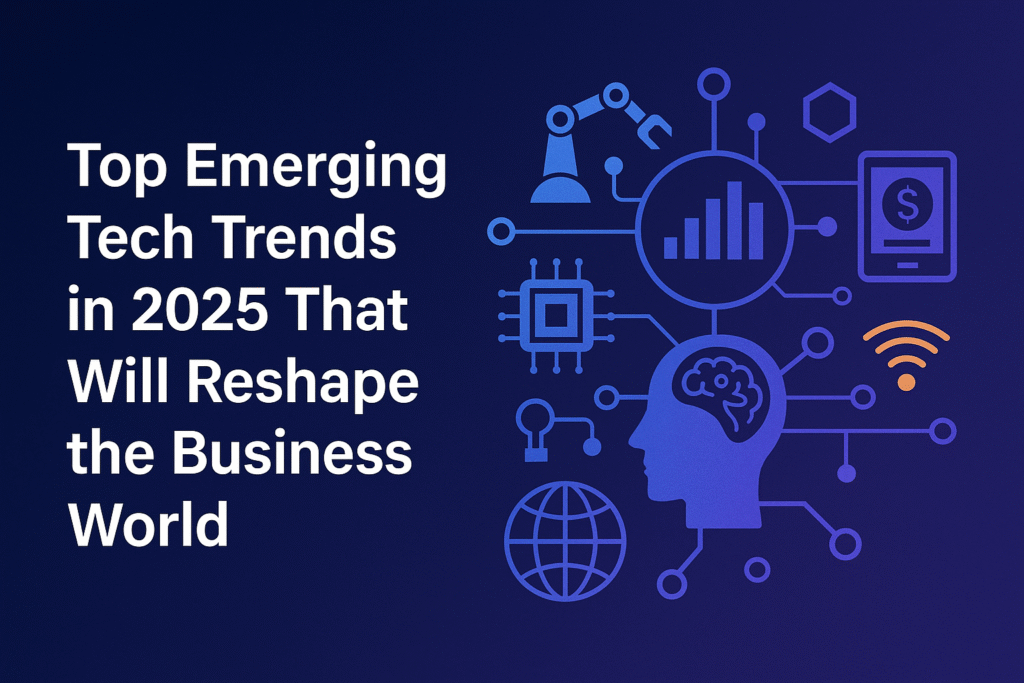
Introduction
As we move deeper into the digital age, 2025 is shaping up to be a landmark year for technological innovation. Businesses around the world, from startups to global enterprises, are racing to adapt to trends that will redefine the way we live, work, and grow. For entrepreneurs, tech enthusiasts, and business leaders, staying ahead of these changes is not just an advantage, it’s a necessity.
In this article, we explore the most significant tech trends of 2025 that are poised to transform industries and redefine global markets. Whether you’re in the UK, USA, or any part of the world, these insights will help you understand what’s next.
1. AI-Powered Everything: From Assistants to Automation
Artificial Intelligence has evolved from a buzzword into a core component of business success. In 2025, we will see AI embedded into virtually every aspect of operations. From customer service bots that handle complex queries to AI-driven marketing strategies that personalize every ad, the AI revolution is in full swing.
Benefits:
- Cost reduction through automation
- Hyper-personalized customer experience
- Improved data analytics and decision-making
Tip: Businesses that haven’t started integrating AI tools into their operations need to catch up fast. Tools like ChatGPT, Jasper, and Midjourney are just the beginning.
2. The Rise of Quantum Computing
Quantum computing is no longer science fiction. Major tech giants like Google, IBM, and Intel are investing billions to make quantum computing scalable and commercially viable. In 2025, we will witness more breakthroughs that will impact fields like cryptography, drug discovery, and climate modeling.
Real-World Impact:
- Financial modeling that analyzes millions of variables in seconds
- Revolutionizing logistics and supply chain with optimization at an unimaginable scale
Tip: While quantum computing isn’t yet mainstream, keeping up with its development can help businesses prepare for the future.
3. Edge Computing: Speed and Efficiency at the Source
Edge computing brings processing closer to the source of data, which means faster speeds and reduced latency. With the rise of IoT devices and remote work, edge computing is becoming a game-changer.
Why It Matters:
- Real-time data processing without sending everything to the cloud
- Better security and privacy for sensitive information
- Crucial for autonomous vehicles and smart cities
Tip: If your business relies on real-time operations, investing in edge computing infrastructure can give you a serious competitive edge.
4. Sustainable Tech and Green Innovation
Sustainability is no longer optional. In 2025, eco-friendly technologies are taking center stage. From carbon-neutral data centers to smart energy management systems, companies are investing in green innovations that align with global ESG (Environmental, Social, Governance) goals.
Examples:
- Solar-powered manufacturing units
- Biodegradable electronics
- AI for climate prediction and disaster response
Tip: Positioning your brand as sustainable can win consumer trust and loyalty in today’s eco-conscious market.
5. Web3 and Decentralized Applications
Web3 is the next iteration of the internet decentralized, secure, and user-owned. Blockchain technology is enabling applications that don’t rely on central authorities. From decentralized finance (DeFi) to NFTs and DAOs, Web3 is redefining how we interact online.
What It Means for Business:
- Greater transparency and reduced fraud
- New funding models (tokenized assets, smart contracts)
- Enhanced privacy for users
Tip: Start exploring how your business can adopt Web3 principles. It’s not just for crypto companies anymore.
6. Mixed Reality (AR + VR): The New Digital Experience
Virtual Reality (VR) and Augmented Reality (AR) are merging into what is known as Mixed Reality. In 2025, these technologies are being used for training, product demos, virtual shopping, and even remote collaboration.
Impactful Use Cases:
- Virtual try-ons for eCommerce
- Remote team meetings in 3D spaces
- Immersive training for healthcare and manufacturing
Tip: Investing in AR/VR content creation or platforms can set your brand apart in a competitive digital space.
7. Cybersecurity 2.0: The Zero Trust Model
With cyberattacks growing more sophisticated, traditional perimeter-based security is no longer enough. In 2025, Zero Trust architecture — where every user and device is verified continuously is becoming the standard.
Why It Matters:
- Protection against insider threats
- Better compliance with international data regulations
- Enhanced security for remote and hybrid teams
Tip: Prioritize cybersecurity in your digital transformation strategy. A breach can cost more than just money; it can destroy trust.
8. 6G and the Next Level of Connectivity
While many countries are still rolling out 5G, research into 6G is well underway. With speeds expected to be 100x faster than 5G, 6G will unlock futuristic applications like real-time holograms, tactile internet, and high-precision remote surgeries.
Tip: Begin future-proofing your digital products and services. The businesses that prepare early will lead the next wave.
Conclusion
2025 is not just another year, it’s a turning point. These tech trends are more than just innovations; they are shaping the foundation of tomorrow’s economy. For businesses that embrace them with open arms, the opportunities are limitless.
Whether you’re a tech startup founder, a marketer in London, a supply chain manager in New York, or a student in Dubai dreaming of launching the next big thing, the future belongs to those who evolve.
Also Read: Ripple IPO: The Implications It May Have on the Worldwide Crypto-World


